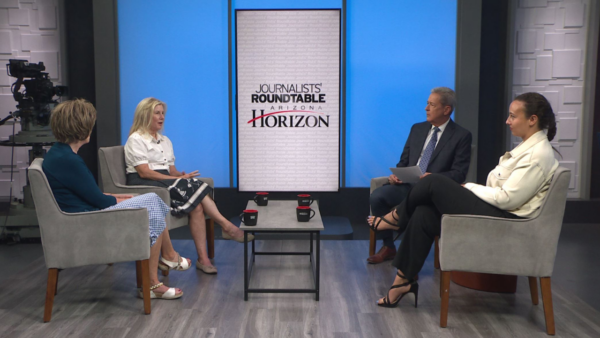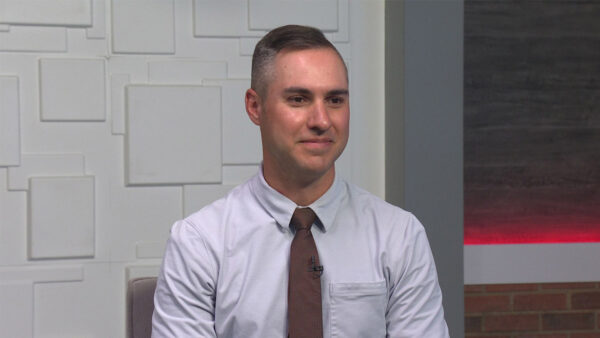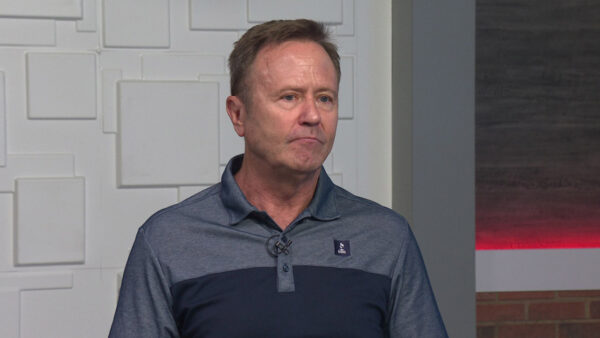The editors of Science magazine selected Kip Hodges, founding director of Arizona State University’s School of Earth and Space Exploration (SESE), as one of 15 recipients of the Science Prize for Inquiry Based Instruction. Hodges talks about his inquiry-based approach to science education.
Ted Simons: Thank you for having me. We want to hear from you. Submit your questions, comments, and concerns via email at "Arizona Horizon".
Ted Simons: An ASU professor has been honored for his work in developing a new method to Teach science. Kip Hodges, founding director Of ASU's school of earth and space exploration, was one of 15 recipients of the science prize for inquiry-based instruction, awarded by the editors of "science magazine." here now to talk about his innovative and award-winning teaching method is Kip Hodges. Good to see you again.
Kip Hodges: Thank you for having me.
Ted Simons: Inquiry-based instruction, what does it mean
Kip Hodges: It is important to start out a conversation about that thinking about what universities really are in our society. At universities we educate and we create. A lot of times it's easy for many members of society to forget the creativity that is a fundamental part of the university experience. We create great art, scientific investigation, solutions of problems through engineering, and that sort of thing. Sometimes there is a tendency to separate those two things in a university environment. The creativity and the education component of it. And really inquiry-based education or instruction is a way to try to get the two melded together in such a way that we can really begin to nurture creativity in students all of the way through the undergraduate career. I don't like the term inquiry-based instruction, I feel like I don't instruct. I let the students learn.
Ted Simons: It sounds project-based, problem solving, creativity. How do you mix them all together?
Kip Hodges: When the class originally began, a class when I was at MIT before I came to ASU. It was an interesting history in the sense that we had a request -- I had a request, dean for undergraduate curriculum there to come up with 10 ideas that might revolutionize undergraduate education at MIT. I came up with the 10 ideas. University was fortunate enough to get funding for them. A class, solving complex problems, I resigned as dean to teach that class. It was a tremendous amount of fun. Popular with the students. And the idea was to pick a problem that could be stated in a very simple way, but was actually very complex. So, we would -- the first one of these that I taught was -- I gave them the task of designing a mission to Mars to look for signs of past or present life. And what many of them thought when they went into it, oh, this is a problem about building a rocket ship to go to Mars. In order to succeed at this, you have to figure out a way to define life so that you know it as you see it and you have to figure out a way to look at past and present life, not just present life. It became a complex, multidisciplinary problem they were tasked to solve.
Ted Simons: Did you ever throw a monkey wrench in there, uh-oh, the rocket exploded or it didn't take off?
Kip Hodges: Absolutely. I do that every time. It is part of examing them at the end of the semester. Other project-based classes, they don't build something, but imagine-eer a solution to the problem. And then I -- I make them go through a process where they demonstrate what it is that they try to do. I will throw wrenches into the process. I didn't do anything quite as drastic as blowing up the rocket. But that design of the course makes it quite easy to transfer to many different student groups. You could use it in high schools. You could do it for freshman as I did at MIT. I taught a sophomore level class in systems engineering and experimental design, sophomore-level class in the BS program, and currently I'm teaching using the same modality, the catstone class for our BA degree in earth and environmental studies, which is really -- you are can think of it as a science literacy degree for a liberal arts major. It has become a very popular major.
Ted Simons: I would think so. It sounds like teamwork plays a big role in this instruction.
Kip Hodges: It is a major part of it. The teams are of different sizes. Entire class you can think of as a team. Within the entire class, we parse the students into smaller groups between five and eight students. It depends on the size of the class. And those individual teams have a piece of the bigger problem. Not only do the students have to learn to work as part of the large team, but they also have to work as part of a small team. Teams have to work with other teams. It is a practical way of how things get done in the real world
Ted Simons: That is a lesson people in athletics learn -- you don't want to let the other team members down. There is pressure there to do your job.
Kip Hodges: That's right. It is amazing how valuable that pressure is in a class like this. Some students have a hard time understanding that the grade that they get is not a purely individual grade. There are three grades in the class, individual grade, a grade for each of your smaller teams, and there is a grade for the class as a whole. What they are often surprised to find out is that the grade for the individual is actually lower than for the grade for the class as a whole but it helps them understand that being part of solving these complex problems is a very cool thing.
Ted Simons: You, as the instructor, how much do you help? How much do you advise? How much do you teach?
Kip Hodges: That is the hardest part of this class. It is a very difficult class to teach, I think, because it is easy to -- if all you have to do is spout information, it is a very easy thing to teach a class, right? But I react to the students. And I react to them in different ways depending on any given day how they feel and how they're working, if they are making mistakes and I try to guide them into doing things in a better way. But it is a very reactionary way of education. And some faculty are terrified teaching that way, almost like working without a net. I get invigorated by it. One of my favorite things to do.
Ted Simons: You also have to watch the student who is just about ready to drop out, drop off, or just simply not get it and wander away. In real life, they do wander away and you move on. Is that what you do in the class?
Kip Hodges: We do have that, occasionally students that drop out. The drop-out rate in this class is very, very small compared to other classes that I have taught because the students get invigorated and enthusiastic about it. Peer pressure kicks in too. No big deal if you are in a regular class and the kid next to you want to drop the class. In this class, it is one of the people that you are in part dependent on to be successful dropping out. I have seen them many times talk students back in to taking the class and staying in the class.
Ted Simons: Congratulations on the award and continued success.
Kip Hodges:Good to be here.
Ted Simons: Thursday on "Arizona Horizon," the Arizona we want 2.0, update to a report that looks at what Arizonans thing of our state and what they say they want for the state's future, that is at 5:30 and 10:00 on the next "Arizona Horizon." That is it for now. I'm Ted Simons. Thank you so much for joining us. You have a great evening.
Kip Hodges:Founding Director, Arizona State University School of Earth and Space Exploration;























